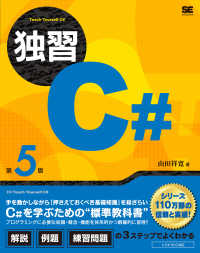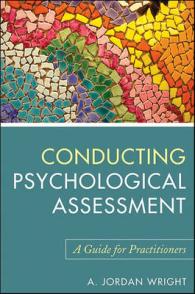Full Description
Reconceptualizing STEM Education explores and maps out research and development ideas and issues around five central practice themes: Systems Thinking; Model-Based Reasoning; Quantitative Reasoning; Equity, Epistemic, and Ethical Outcomes; and STEM Communication and Outreach. These themes are aligned with the comprehensive agenda for the reform of science and engineering education set out by the 2015 PISA Framework, the US Next Generation Science Standards and the US National Research Council's A Framework for K-12 Science Education. The new practice-focused agenda has implications for the redesign of preK-12 education for alignment of curriculum-instruction-assessment; STEM teacher education and professional development; postsecondary, further, and graduate studies; and out-of-school informal education. In each section, experts set out powerful ideas followed by two eminent discussant responses that both respond to and provoke additional ideas from the lead papers. In the associated website highly distinguished, nationally recognized STEM education scholars and policymakers engage in deep conversations and considerations addressing core practices that guide STEM education.
Contents
CONTENTS
Introduction: Coordinating PreK-16 STEM Education Research and Practices for Advancing and Refining Reform Agendas
Richard A. Duschl, Amber S. Bismack, James Greeno and Drew H. Gitomer
Theme 1: Systems Thinking
Thinking about a System and Systems Thinking in Engineering
Thomas A. Litzinger
Diagnostic Instruction: Toward an Integrated System for Classroom Assessment
Jim Minstrell, Ruth Anderson, and Min Li
Response 1: Systems Thinking as a Design Problem
Marcela Borge
Response 2: Improving Learning about Systems Requires Designing for Change in Educational Systems
William R. Penuel
Theme 2: Model-Based Reasoning
Modeling Authentic STEM Research: A Systems Thinking Perspective
Annmarie R. Ward
Meeting the Standards for STEM Educations: Individual and National Needs
Spencer A. Benson
Response 1: Model-Based Reasoning in Professional Development
Hilda Borko
Response 2: "Where is the line?"
Brian P. Coppola
Theme 3: Quantitative Reasoning
Quantitative Reasoning in Mathematics Education: Directions in Research and Practice
Heather Lynn Johnson
Teachers Use of Data, Measurement, and Data Modeling in Quantitative Reasoning
Anthony J. Petrosino
Response 1: Quantitative Reasoning in STEM Disciplines
Robert Mayes
Response 2: Quantitative Reasoning: Capturing a Tension Between Structure and Variability
Rose Mary Zbiek
Theme 4: Equity, Epistemic, and Ethical Outcomes
Educational and Ethical Dilemmas for STEM Education in Pennsylvania's Marcellus Shale Gasfield Communities
Catharine Biddle & Kai A. Schafft
Defining a Knowledge Base for Reasoning in Science: The role of procedural and epistemic knowledge
Jonathan Osborne
Response 1: Views from Above and Below: Access to Science Education
Nancy Brickhouse
Response 2: The Values of Science Literacy
Nancy Tuana
Theme 5: STEM Communication and Policy Outreach
Why People Care About Chickens and Other Lessons about Rhetoric, Public Science, and Informal Learning Environments
Stacey Pigg, William Hart-Davidson, Jeff Grabill, and Kirsten Ellenbogen
New Environments for Professional Development: Situating Science Learning and Teaching in a Framework and NGSS World
Jean Moon
Response 1: School-System Contexts for Professional Development
Edward J. Fuller
Response 2: Technology-supported Communication in Science: Conjectures on Expertise and Evaluation
Drew H. Gitomer
Reflections and Summary
Reflections on the Waterbury Summit: STEAM And Systems Thinking
Stephanie E. Vasko
Summary: Driving Change Forward
Amber S. Bismack, Yann Shiou Ong, Armend Tahirsylaj, and Richard A. Duschl
About the Authors
Waterbury Summit Participants








